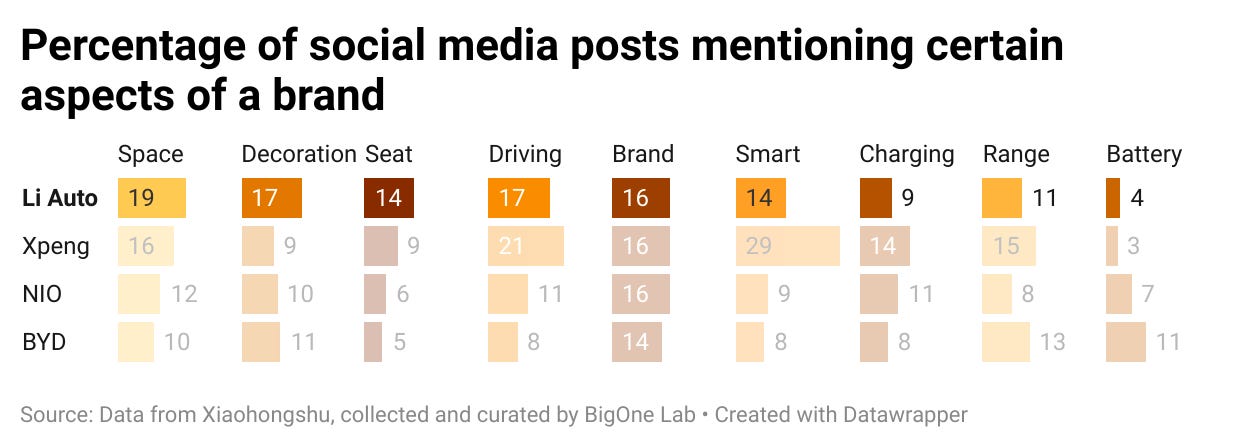Why Li Auto wins out with not-so-superior technology
Li Auto is redefining the role of the car in modern society, envisioning it as a replacement for the carriage rather than the horse
China's burgeoning new energy vehicle (NEV) market has entered an interesting stage. Among the 3 young NEV brands of Li Auto, Nio and Xpeng, Xpeng supposedly with the most advanced smart technology, has the worst sales numbers. Nio, with supposedly superior battery technology, is constantly No.2. But Li Auto, the one with supposedly the least advanced technology (they don’t even have a purely electric model), becomes by far the best-selling brand. It seems, quite counter-intuitively, that technology is negatively correlated with actual sales.
Why is that the case? We found a few good posts on Zhihu, China's equivalent of Quora, that commented on this phenomenon. It seems Li Auto's success lies in their keen understanding of consumer preferences in China. Instead of selling a car, Li Auto is actually selling a "space product", a sort of family movie theater cum bedroom on the wheels. And it turns out this is what Chinese consumers actually want.
This viewpoint is well supported by data from BigOne Lab's social media datasets. On Xiaohongshu, China's leading social media platforms, among the social media posts about NEV brands from June 2021 to Jan 2023, the percentage of posts mentioning "space", "decoration", "seat" is the highest for Li Auto. Xpeng on the other hand, is more closely associated with being "smart" by a huge margin, despite the worst sales performance right now among its peers.
Besides these common keywords, we also did another analysis of keywords that are unique to certain brands. The conclusion is the same. Lifestyle-oriented words like "smell", "foot mat", "fragrance" are most unique to Li Auto, while words like "voice control", "autonomous parking" are most unique to Xpeng.
The following is our translation of the three Zhihu posts to provide you with a more intuitive understanding of the differences between these brands.
Commentary #1 (paraphrased)
When the Li Auto L7 was released, I watched the entire launch with great interest. To my surprise, the presentation didn't focus on the car's driveability or technical specs. Instead, it highlighted the car's spacious and luxurious interior. The L7 was described as a well-furnished one-bedroom apartment on wheels, complete with a range of amenities such as queen seats, massage and ventilation functions, and ample storage space. The car's large screen and sound system were also showcased, emphasizing its potential as a VIP theater, family concert hall, or game room.
What struck me most about the launch was Li Auto's innovative approach to the car market. By prioritizing comfort and entertainment, the company is able to appeal to a broader consumer base beyond traditional car enthusiasts. This has proven to be particularly effective in China, where consumers prioritize space, fuel efficiency, and features over technical specifications.
Li Auto is redefining the role of the car in modern society, envisioning it as a replacement for the carriage rather than the horse. The company recognizes that consumers don't just need speed and efficiency, but also comfort and entertainment on their journeys. This is reflected in the design of their vehicles, which are marketed as mobile comfortable homes.
When I had the opportunity to test drive the Ideal L9, I was immediately impressed with its spacious and comfortable interior. The car's potential as a mobile VIP theater and concert hall was evident, making it an ideal fit for families. If I had the budget, I would definitely consider purchasing the Ideal L9 for its luxurious and versatile features.
Overall, Li Auto's success can be attributed to their unique approach to the car market. By positioning their vehicles as consumer goods rather than functional equipment, Li Auto has been able to reach a wider consumer base beyond traditional car enthusiasts. The company's focus on comfort and entertainment reflects a shift in consumer priorities, and Li Auto seems well-positioned to capitalize on this trend.
Commentary #2
NIO
Consumer: I want A.
Nio: We have a wide range of businesses, BCDE. Buy my car, you buy a whole new lifestyle~
Consumer: I still want A...
Nio: Oops, [you have to understand] BCDE is so good. Is A still important?
Xpeng
Consumer: I want A.
Xpeng: Our goal is F! You know what, F is just too good. It's the stars and oceans of technology!
Consumer: So when will you get your F?
XPeng: Don't worry, a few more years! You try our f first ~ [BAiGUAN: 'f' apparently refers to Xpeng's focus on smart driving technology that is not yet perfect enough for use]
Li Auto
Consumer: I want A.
Li Auto: I'll give you AAAAAAAAAAAAAAAAA
Commentary #3
Keep reading with a 7-day free trial
Subscribe to Baiguan - China Insights, Data, Context to keep reading this post and get 7 days of free access to the full post archives.




